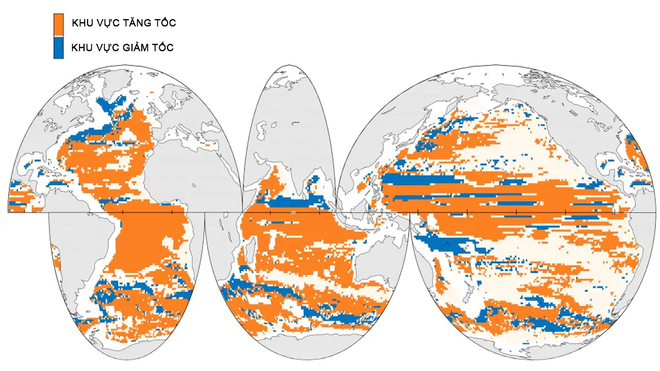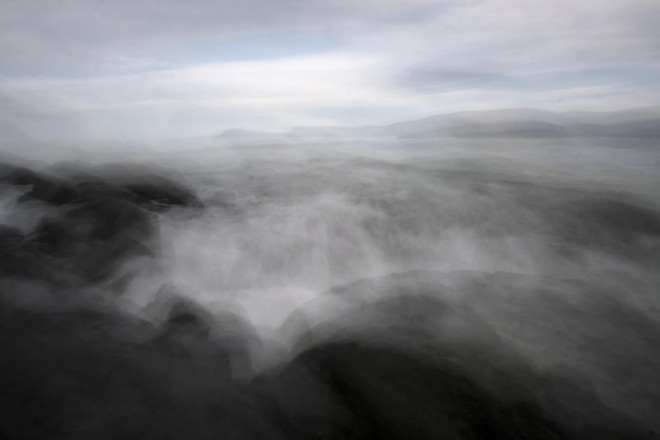Climate change is causing the sea to flow faster, scientists are still confused about what the harm will be

South Kingstown Coast
Based on a scientific report published on Wednesday, in recent decades, three-quarters of the world's seawater has increased its rate of flow. This phenomenon is not expected to happen until the climate change is much more serious.
The cause of this phenomenon comes from the acceleration of the winds, thus increasing the energy applied to the surface of the sea and creating faster currents and increasing the circulation of the sea.
This is the new notorious discovery of extreme changes in the sea around the globe. In addition to that, there are a number of other findings we can name such as the mass deaths of giant coral reefs, the fluctuations of fishing, the melting of ice sheets in Greenland and the North. Extreme due to sea level, an increase in sea heat waves and an increase in the rate of sea level rise.
"The Earth is our patient, and you have to look for its symptoms when affected by greenhouse gases," says Michael McPhaden. He is a researcher at the US National Bureau of Meteorology and Hydrology and author of the new report published in Science Advances. "This is yet another symptom," he added.
The new report found that 76% of seawater worldwide is flowing faster, of which only 2,000 meters of near-surface seawater is considered. The most intense speed increase lies in the tropical seas and especially the vast Pacific Ocean.
Scientists are not sure what the consequences of this increase in sea velocity are. But that would most likely include the impact on areas stretching on the West Coast of continents, where many currents accelerate significantly. In some cases, research results show that the main consequence is the damage to hot spots that are home to many marine creatures.

Areas with sea currents accelerate and decelerate
The study was led by Shijian Hu, a scientist at the Chinese Academy of Sciences; Professor Shijian has worked with McPhaden and other experts from China, Australia and the United States. Scientists use a global network of devices called Argo Floats, along with other data sets, to draw their conclusions.
They found that the increase in wind power on the surface of the sea has been about 2% every ten years since the 1990s, and that has increased the rate of ocean currents by 5% every decade.
Because the speed of these currents is inherently slow, it is difficult for a boatman to notice the difference between the front and the back. According to McPhaden, the South Equatorial Current in the Pacific Ocean flows at a speed of about 1.6 km / h, over a decade it will only increase to about 1.7 km / h.
Although the level of increase is not great, but this phenomenon occurs worldwide, it means a big change and the sea has received a huge amount of energy from wind power. Not only that, this phenomenon is expected to be far from happening.
The report notes that in extreme warming cases of the climate, an increase in wind speed will also occur - but the change is expected to peak at the end of this century, after the Earth Much hotter than now. According to McPhaden, this indicates that our practice is much more sensitive to climate change than the current simulation models can be.
The researchers admit they cannot prove the changes they detected were entirely due to greenhouse gases. Oceans, especially the Pacific Ocean, have natural cycles that can also change the speed of ocean currents. However, they argue that the changes are "much more serious than those caused by nature" .
This is not only happening in one place, recently many oceans in the world have been discovered to have major changes.
With the discovery of a major change in the global ocean, scientists say they have yet to find the consequences that the surrounding localities suffer. However, they will definitely be very noticeable.
"Perhaps the most important consequence of major currents is the increase in the redistribution of heat around the Earth , " said Alex Sen Gupta, a marine and climate expert at the University of New South Wales in Sydney city, said. "This phenomenon will affect the heat distribution and may affect the weather system - but more research needs to be done to ensure these links exist . "
Edward Vizy, another marine and climate expert at the University of Texas in Austin, USA, says he doubts scientists are about to discover something with their findings, but maybe the changes are not as serious as reported.
"I'm pretty sure our ocean exploration and analytics capabilities improved in the early 2000s, so I wonder how much the above variation reflects that," Edward said.
So far, when it comes to the effects of climate change on ocean currents, much of the attention has been placed in the northern Atlantic region. There, a large system of ocean currents, known as the Atlantic Rotating Meridian, is moving slower, not faster.
However, this current is not only driven by wind but also by the density of cold seawater. This density determines the amount of water that can sink and float southward in the deep sea, so it is likely that the results are not contradictory.
In the study, McPhaden and colleagues found that around the world, some ocean currents in the western basin of the oceans are changing the way they travel and, in some cases, accelerating. flow. As a result, these currents often create extremely warm areas when they transport warm water to new locations.
These changes are also due to the variation of sea breezes so they can be linked.

Waves struck the coast of Tasmania Island, Australia
For example, on the east coast of Australia and the island of Tasmania, there is a current known as the East Australian Stream that flows faster and further south, bringing warm water to the coast of Tasmanians and destroying it. Natural kelp forest ecosystems have flourished here. The new report shows the variation of a current within this region.
"There is a rationality that indicates that these phenomena are related , " McPhaden said.
However, research on ocean currents does not focus on impacts on local life but on the whole world.
"Research only pays attention to the whole planet , " McPhaden said. "It is amazing that an outcome like this appears to be completely unexpected . "
According to TheWashingtonPost
You should read it
- ★ Global warming can weaken wind power, a study predicts
- ★ What is left of Asia if the whole ice on Earth melts?
- ★ Global warming is killing intestinal bacteria in lizards
- ★ Science warning: When the climate gets hot, the ocean will become more toxic
- ★ Robot Boys help measure the impact of climate change